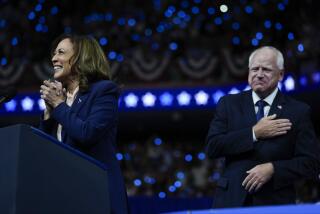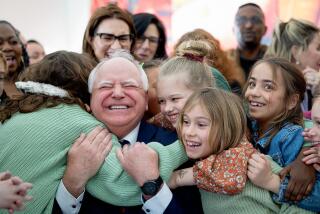Veep Game Keeps Political Suspense Alive
- Share via
WASHINGTON — With all the hype and none of the glitter, the Beltway is abuzz with its very own version of Oscar-mania: rampant speculation over who will join Al Gore and George W. Bush as their vice presidential running mates.
A decision is some ways off. Why decide now, when circumstances could change?
Still, conjecture abounds. How about Sen. Charles Hagel? The Nebraska Republican is a Vietnam vet and campaign reformer, without the jagged edges of Arizona Sen. John McCain.
Or Sen. Evan Bayh? He’s an Indiana Democrat popular in that Republican-leaning state, so his corn-fed charm might help Gore elsewhere in the Midwest.
Every Washington chat show worth its weight in pundits is filled with talking heads offering just such gratuitous advice. Press secretaries are trolling their call sheets, praying that the media’s Great Mentioners put their bosses’ names into play. (California Rep. Nancy Pelosi! Nancy Pelosi?)
Long Lists, Little Reality
Recently, The Hotline--a political digest and must-read for the campaign cognoscenti--published a list of 20 Democrats and 22 potential Republican running mates. The number was sufficient to fill the vice presidency and stock the next White House Cabinet nearly three times over. The names ranged from plausible (former Defense Secretary Dick Cheney, a Republican, and Sen. Bob Graham of Florida, a Democrat) to farfetched (Republican Rep. Jennifer Dunn of Washington state) to even farther-fetched (first-term California Democratic Gov. Gray Davis).
The point is that virtually anyone and everyone is somewhere on somebody’s list. All you have to do is stand up and be counted (preferably while publicly disavowing the least bit of interest in the No. 2 spot). “It’s a game,” said Republican strategist Don Sipple. “A flattering game.”
At the same time, the selection of a running mate could be the most important decision the presumptive nominees make between now and November. So when the time comes, weeks or months from now, all the advice from those armchair experts will give way to certain cold-eyed realities.
Balance of some sort--geographic, ideological--is always high on the list. The ability to carry an important state is another consideration. That would give Gore a strong incentive to choose, say, Graham, to boost his prospects in Florida, a state Bush almost certainly has to win to capture the White House.
The same rationale might prompt Bush to select Pennsylvania Gov. Thomas J. Ridge to help in that tossup state, or New York Gov. George Pataki to try to nudge that Democratic leaner away from Gore’s column.
But it gets more complicated. Ridge and Pataki are both Catholics, which could help Bush with that bloc, a potential swing group in several battleground states. But Ridge and Pataki also are pro-choice on abortion, which could hurt Bush with Christian conservatives.
As those convoluted calculations suggest, there is no one perfect candidate, except theoretically Colin L. Powell (though some suggest his wattage could pale either nominee in contrast). No matter. The retired Army general has said repeatedly that he’s not interested.
The uppermost rule, based on painful experience, is one borrowed from medicine: First do no harm.
“The No. 1 thing you don’t want to do is anything that would hurt the top of the ticket,” said David Doak, a Democratic strategist. Think Dan Quayle. Think Geraldine A. Ferraro. Think Thomas F. Eagleton, who was dropped from George S. McGovern’s ticket in 1972 after reports that he had undergone treatment for manic depression.
By no coincidence, Eagleton was the last running mate to be selected at his party’s national nominating convention. Now the choice is typically made days, if not weeks, before the conventions--after weeks, if not months, of screening.
Presidential contenders “don’t want to make hasty decisions that blow up in their faces,” said Michael Nelson, a vice presidential expert at Tennessee’s Rhodes College. “Eagleton showed the real risks of not thoroughly vetting the people you’re considering.”
Thus, serious candidates will be asked to supply the Bush and Gore camps with voluminous amounts of personal information. Besides the obvious--health records, tax returns--possible running mates probably will be asked to provide legal documentation for any household worker they’ve ever hired, to describe every investment they’ve ever made, to name every charitable cause they’ve ever supported and to recount every group they’ve ever spoken to.
“You want to know it before anyone else knows it,” said Tony Fabrizio, a Republican strategist who helped Bob Dole settle on Jack Kemp as a running mate four years ago. “You don’t want to find out the day [a running mate] is announced that he gave a speech to some apartheid group in South Africa.”
Typically, the most effective means of vetting is the election process. That explains why nominees tend to pass over political outsiders in favor of an officeholder with a well-established record.
“For all those little detours down novelty lane, it usually comes back to very basic questions of electoral viability and political seasoning,” said Sipple, another veteran of Dole’s 1996 campaign.
After a candidate has been thoroughly scrubbed, the most important consideration is what he, or she, might bring to the ticket.
In retrospect, most analysts view Gore’s selection by then-Arkansas Gov. Bill Clinton in 1992 as a masterstroke, although superficially they seemed to be a matched set of moderate baby boom Southerners.
But the balancing was more subtle, as Nelson pointed out: “Clinton picked someone who was a veteran, whereas he never served [in the military], and he picked someone known as a solid family man, whereas that was a doubt in his case.”
Addressing Weakness at the Top
Such thinking reflects another strategy: picking a running mate who can address a perceived weakness at the top of the ticket. Under that approach, Texas Gov. Bush might pick someone like Powell or Cheney, who have strong foreign policy credentials and long Washington resumes. Gore, bearing the baggage of the 1996 fund-raising scandal, might opt for a reformer like Sen. Joseph I. Lieberman of Connecticut or his erstwhile opponent, ex-New Jersey Sen. Bill Bradley.
New Jersey is one of the biggest states up for grabs in November. But Bradley’s poor showing in the primaries and lingering animosities from a bitter Democratic fight--though nothing like the hard feelings between Bush and McCain--make his selection highly improbable. (Unless Gore opts for tactical magnanimity, as Ronald Reagan did in 1980 when he selected onetime foe George Bush as his running mate.)
Bush and Gore will probably make their decisions as close as they can to the summertime conventions, allowing the best sense of their needs heading into the fall. “If you’re 15 points ahead, the do-no-harm rule becomes paramount,” Fabrizio said. “If you’re far behind and have nothing to lose, then you go for something broader or bolder.” In that case, Bush or Gore might choose a woman, an African American or a Latino, in hopes of injecting excitement into a flagging campaign.
For now, both shun the Beltway buzz-buzz. There is no “short list or even long list,” insisted Doug Hattaway, a Gore spokesman who could speak for both candidates when he cites Gore’s overriding concern: simply that his running mate “be somebody who could step into the job of president right away if necessary.”
(BEGIN TEXT OF INFOBOX / INFOGRAPHIC)
Vice Presidential Possibilities
A few of the many prospects being mentioned as potential running mates:
THE DEMOCRATS
Evan Bayh
Indiana senator
The freshman senator and former governor is seen as a comer in Democratic circles. Indiana has relatively few electoral votes, so not much help there. But if Gore wants a Gore--someone safe and solid--Bayh fits the bill.
*
Bob Graham
Florida senator
Could put Florida into play and perhaps offset Bush’s advantage in that must-win Republican state, where Bush’s brother Jeb is governor.
*
Joseph I. Lieberman
Connecticut senator
His straight-shooter reputation could buff Gore’s tarnished ethical image. But is America ready to elect a Jewish vice president?
*
Bill Richardson
Energy secretary
An aggressive partisan back in his House days, Richardson’s selection would be a breakthrough, making him the first Latino to run on a major party ticket.
THE REPUBLICANS
Dick Cheney
Former Defense secretary
Sterling credentials and an impressive Washington resume, but a bad heart makes health questions an issue.
*
Elizabeth Hanford Dole
Former Cabinet secretary
Could excite female voters and enhance Bush’s almost forgotten “compassionate conservative” image. But as a presidential candidate in her own right she proved a big disappointment.
*
George Pataki
New York governor
Could turn New York from a Democratic leaner into a competitive state, cutting Gore’s Electoral College base. But his pro-choice position on abortion and support for gun control could make him anathema to many conservatives.
*
Thomas J. Ridge
Pennsylvania governor
A strong fund-raiser and Vietnam vet, he could help Bush carry a vital swing state. A Catholic, he could help Bush with that important constituency. But his pro-choice stance on abortion could antagonize conservatives.
More to Read
Get the L.A. Times Politics newsletter
Deeply reported insights into legislation, politics and policy from Sacramento, Washington and beyond. In your inbox twice per week.
You may occasionally receive promotional content from the Los Angeles Times.











